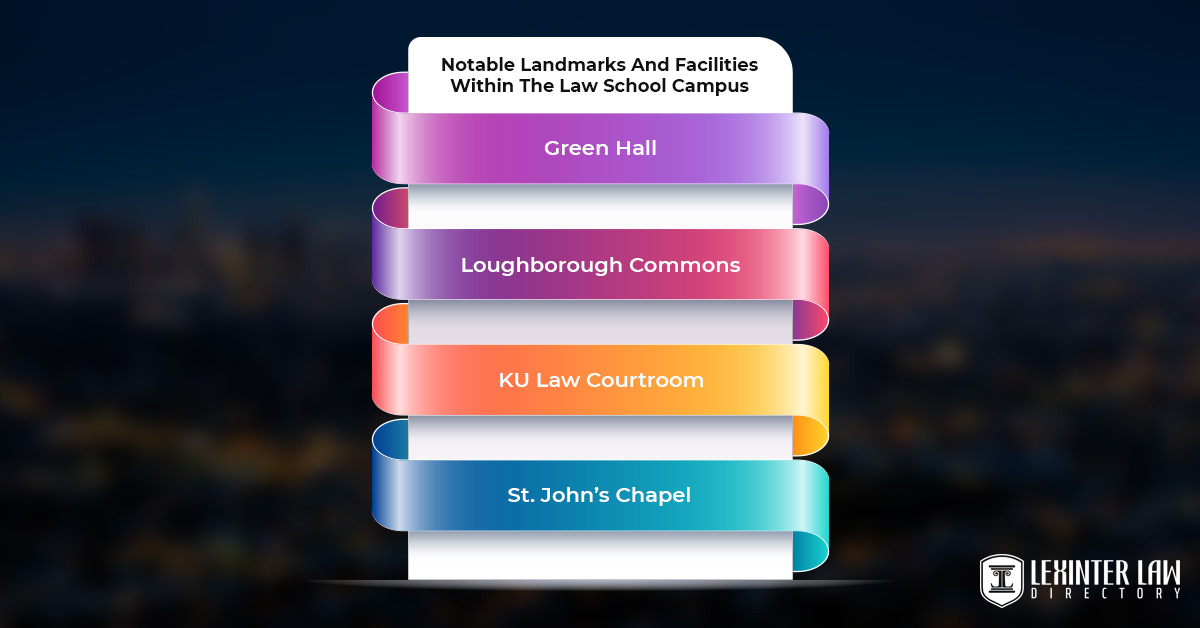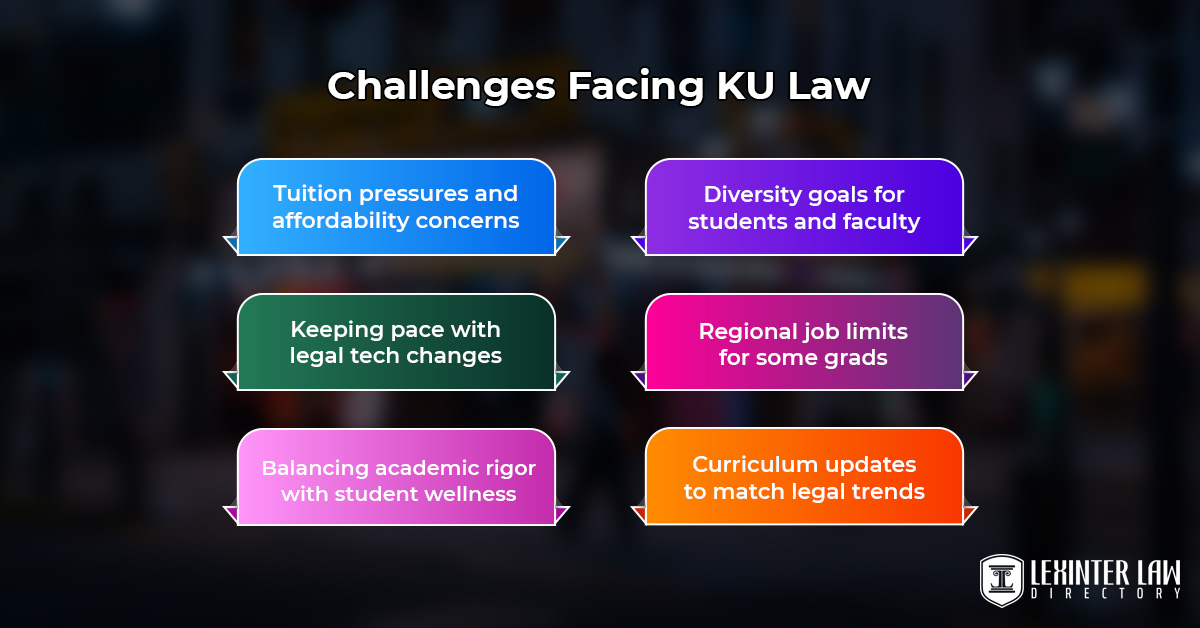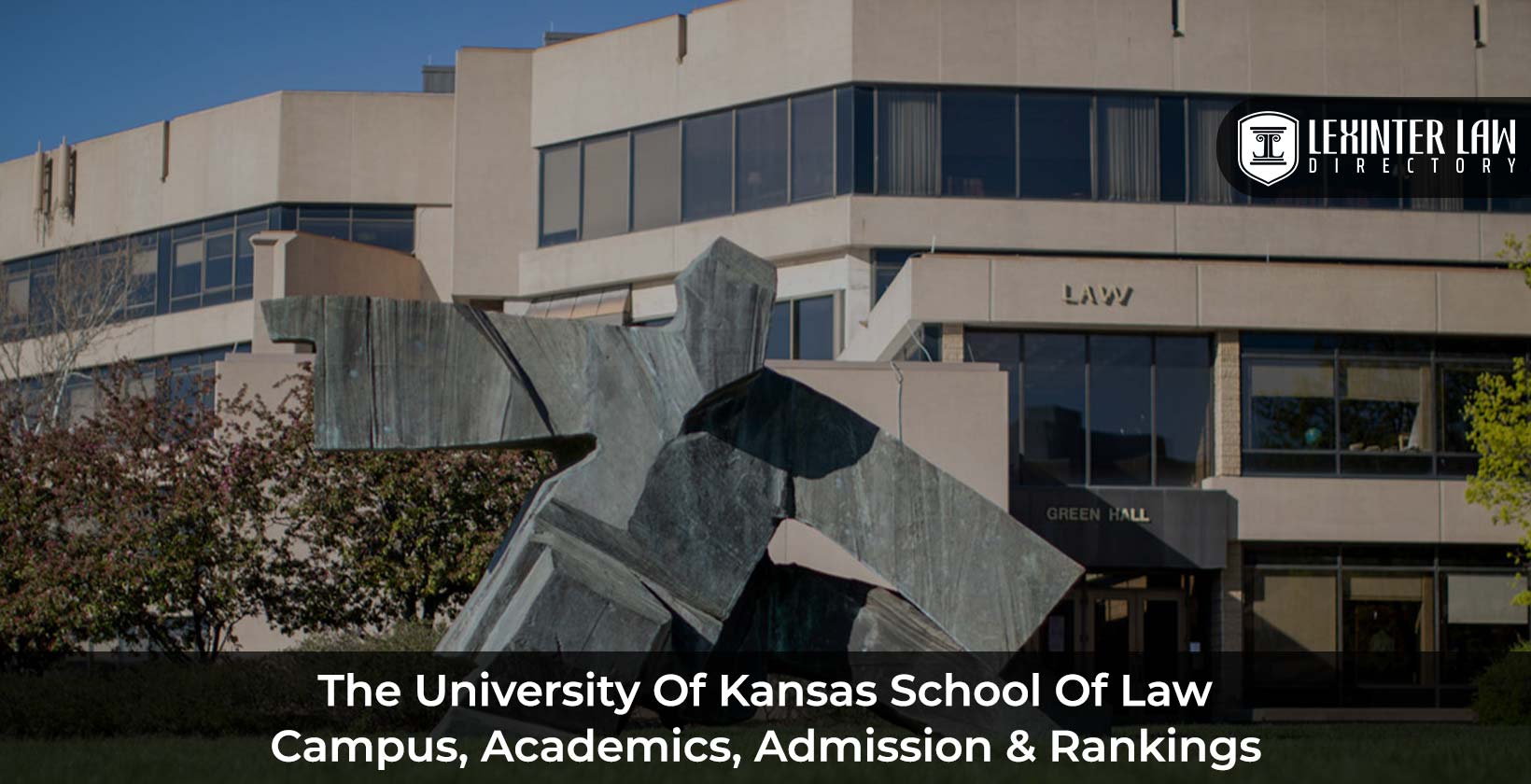The University Of Kansas School Of Law: Campus, Academics, Admission & Rankings
Are you aspiring to become a skilled and confident legal professional? The University of Kansas School of Law (KU Law) offers a dynamic environment where academic excellence meets real-world experience. Located in Lawrence, Kansas, KU Law equips students with the tools needed to succeed in today’s evolving legal landscape.
From nationally ranked programs in advocacy and environmental law to extensive clinical opportunities and global partnerships, KU Law fosters both intellectual growth and professional development. It’s a place where future lawyers learn, lead, and launch impactful careers across diverse legal fields.
Table of Contents
- Location And Campus
- Academic Excellence At KU Law
- Admissions And Acceptance Rate At KU Law
- Rankings And Recognition: Shining Bright Among Law Schools
- Campus Life And Community: Thriving Beyond The Law Books
- Career Services And Opportunities: Launching Your Legal Future
- Notable Programs And Centers: Elevating Legal Education At KU Law
- Challenges And Opportunities: Embracing Growth At KU Law
- Frequently Asked Questions About The University Of Kansas School Of Law
- Conclusion
Location And Campus
The University of Kansas School of Law is located in Lawrence, Kansas. It offers a supportive academic environment, vibrant campus life, and beautiful surroundings, providing law students with the perfect setting to thrive professionally and personally.
Address Of The University Of Kansas School Of Law
The KU School of Law is situated at:
1535 West 15th Street, Lawrence, KS 66045
Phone: (785) 864‑4378
Located on the University of Kansas’ main campus, Green Hall houses the law school. Students benefit from a central location, easy access to faculty, library resources, and proximity to university-wide academic and cultural facilities.
Description Of The Lawrence, Kansas Campus
Lawrence is a vibrant college town featuring historic architecture, tree-lined streets, and a lively arts scene. The University of Kansas campus sits on a hill overlooking the Kansas River Valley. It’s home to notable landmarks like the Campanile, Spencer Museum of Art, and Allen Fieldhouse, offering students a rich blend of academics, culture, and community.
Notable Landmarks And Facilities Within The Law School Campus

The KU School of Law is located on the main KU campus, surrounded by all of the landmarks and facilities mentioned above. However, the law school itself also has many notable features, including:
- Green Hall: This historic building was built in 1903 and is the home of the KU School of Law. It is named after Dean James Green, who was the first dean of the law school.
- Loughborough Commons: This new state-of-the-art facility houses the law school’s library, classrooms, and offices. It opened in 2017 and is designed to provide students with a modern and collaborative learning environment.
- KU Law Courtroom: This courtroom is located in Green Hall and is used for mock trials and other legal simulations.
- St. John’s Chapel: This historic chapel is located on the KU campus and is a popular spot for weddings and other events. The law school holds its graduation ceremony in St. John’s Chapel each year.
Academic Excellence At KU Law
KU Law blends rigorous academics with real-world experience. Students engage in clinics, advocacy training, and research while learning from leading faculty. The curriculum builds essential legal skills, preparing graduates for success in diverse legal careers.
Overview Of Law Programs Offered
KU Law offers a Juris Doctor (JD) program, a traditional law degree, and several joint and dual degree programs. Here’s a brief overview:
KU Law offers a three-year Juris Doctor (JD) program, along with joint degrees like JD/MBA and JD/MSW. Dual international programs provide global legal exposure. Students can earn certificates in areas such as business, environmental, and intellectual property law. This flexible structure allows tailored education and specialization based on personal and professional goals.
Notable Faculty Members And Achievements
KU Law faculty are renowned scholars and practitioners. Professor Raj Bhala is an international trade expert, while Professor Laura Hines leads the Advocacy Center. Professor Christopher Drahozal contributes extensively to arbitration law. These and other faculty members publish influential research, receive national recognition, and guide students through hands-on clinics and advanced legal writing programs.
Unique Academic Initiatives And Programs
KU Law offers ten legal clinics, externships with judges and agencies, and global legal immersion opportunities. Programs like the Shook, Hardy & Bacon Center focus on advocacy, while transactional and tribal law centers deepen practice-specific skills. Certificate programs and tech-integrated learning enhance career readiness, supporting students’ development in both traditional and emerging legal fields.
Admissions And Acceptance Rate At KU Law
The KU Law acceptance rate for the 2024–25 admissions cycle is 38.3%, reflecting a moderately selective process. Each entering class includes around 127 students drawn from over 1,200 applicants across the U.S.
Statistics On The Acceptance Rate
In the 2024 cycle, KU Law received 1,214 JD applications and admitted 465 candidates, yielding an acceptance rate of 38.3%. Of those admitted, 124 enrolled, resulting in a yield rate of 26.7%. The incoming cohort enrolled from 24 states, representing 66 undergraduate institutions.
Admission Requirements And Criteria
KU Law does not mandate minimum LSAT or GPA cutoffs, but competitive applicants typically fall within the middle 50th percentile: LSAT scores of 156–163 (median 161) and GPA of 3.59–3.89 (median 3.79). The admissions committee evaluates academic performance, analytical ability, and potential for legal study success.
Other Application Materials
Applicants submit a personal statement, résumé, and letters of recommendation to highlight leadership, motivations, and academic or professional achievements. Optional supplements—like addenda—may address unique experiences or challenges. KU Law encourages authentic writing to demonstrate character and future potential.
Tips For Prospective Students On Gaining Admission
Aim for strong academic credentials: undergraduate GPA at or above 3.7 and LSAT around 161. Craft a compelling personal statement and obtain robust recommendations. Engage with KU Law via campus events or virtual sessions to show fit. Apply by the March 1 priority deadline for the best scholarship and admission chances.
Rankings And Recognition: Shining Bright Among Law Schools
KU Law is nationally recognized for values‑driven legal education, placing in the Top 50 overall and ranking within the top 20 public law schools, with specialty programs and faculty productivity earning high praise.
Current Rankings
In U.S. News & World Report 2025, KU Law ranks #50 (tie) overall and #24 among public law schools. Specialty program rankings include #17 for legal writing, #25 for environmental law, and #29 in dispute resolution—each within the national Top 30, and top 15 among public institutions.
Comparison With Other Law Schools
It’s important to consider KU Law’s position within its regional context:
- Midwest Region: In the U.S. News & World Report’s Best Law Schools regional rankings, KU Law currently ranks 3rd. This places it among the top contenders in the region. It offers a good option for aspiring lawyers who want to stay closer to home.
- Public vs. Private Schools: Comparing KU Law’s ranking to public and private schools presents a nuanced picture. Its ranking within the Top 20 public law schools shows its excellence. It has not yet competed with the top private law schools in the national rankings.
Factors Contributing To The School’s Rankings
KU Law’s rankings benefit from high employment rates, strong bar passage success, and affordability, which feed into value rankings such as those by National Jurist. Scholarly output is also notable—KU is #19 in faculty impact among publics, based on citation metrics. Its specialty emphasis and hands-on clinics bolster academic reputation and student readiness.
Campus Life And Community: Thriving Beyond The Law Books
At KU Law, learning extends beyond lectures. Students experience a collaborative, inclusive environment enriched by dynamic student groups, community engagement, and campus traditions—making law school not only intellectually stimulating but personally transformative.
Description Of The Student Body And Diversity
KU Law fosters a diverse, inclusive community representing a range of backgrounds, experiences, and viewpoints. While many students come from Kansas and the Midwest, the school actively welcomes applicants nationwide. The student body includes individuals of varying races, ethnicities, genders, and socioeconomic statuses, enriching classroom discussions and preparing students for inclusive legal practice.
Extracurricular Activities And Student Organizations
KU Law offers a wide array of student organizations—from the Student Bar Association to affinity groups and competitive moot court teams. Students participate in journals, advocacy competitions, pro bono work, and public interest projects. These extracurricular opportunities enhance leadership skills, promote collaboration, and help students build a strong legal identity outside the classroom.
Integration With The Lawrence Community
Lawrence, Kansas offers a vibrant setting that blends college-town energy with small-city charm. KU Law students engage through volunteer work, legal clinics, internships, and local partnerships. The community supports student learning with accessible courts, government offices, and nonprofits—fostering real-world experience and lasting professional relationships in a culturally rich and welcoming environment.
Career Services And Opportunities: Launching Your Legal Future
KU Law’s Career Services Office offers personalized support, robust programming, and employer connections to advance every student’s legal ambitions and secure meaningful, long‑term career outcomes in law and related professions.
Overview Of Career Services Offered
The Career Services Office provides one-on-one counseling, résumé and cover letter reviews, mock interviews, professional workshops, and virtual CSO Boot Camp training. Students access Symplicity for jobs, externships, clerkships, and employer events.
Annual programs include Legal Career Options Day and public interest fairs. Reciprocity agreements expand support for students seeking work in other states.
Internship And Job Placement Statistics
The Class of 2024 achieved 100% overall employment within ten months, with 96.6% in full‑time, long‑term, law‑related roles. KU Law has maintained over‑90% overall employment for eleven straight years. Its bar passage rate ranks 28th nationally, with nearly 92% passing on their first attempt.
Success Stories Of Graduates In Various Legal Fields
KU Law alumni include Judge Jacy J. Hurst (L’06), now serving on the Kansas Court of Appeals, whose leadership began in student government and law review at KU Law. Professor and former U.S. Attorney Stephen McAllister (L’?) exemplifies public service leading from law school into distinguished federal roles.
Notable Programs And Centers: Elevating Legal Education At KU Law
KU Law offers specialized programs and centers that foster deep legal knowledge and practical skills. These initiatives support advocacy, diversity, tribal law, and transactional practice, equipping students to lead and innovate across diverse legal fields.
Highlighting Special Programs And Centers
Key centers include the Shook, Hardy & Bacon Center for Excellence in Advocacy, the Tribal Law & Government Center, and the Polsinelli Transactional Law Center. These programs offer experiential learning, workshops, and faculty-led projects in trial advocacy, Indigenous law, and transactional practice, connecting students with real-world legal challenges and influential professional networks.
Impact On Students’ Academic And Professional Development
Through hands-on simulations, legal clinics, and research projects, students develop courtroom skills, transactional fluency, and cross-cultural competence. These experiences reinforce classroom learning, build résumés, and deepen expertise. By engaging with specialized centers, students emerge professionally polished and academically prepared for careers in litigation, corporate law, public service, and beyond.
Examples Of Research Or Projects Originating From These Programs
The Polsinelli Transactional Law Center leads projects on blockchain regulation, corporate governance, and contract drafting innovations. Meanwhile, advocacy center students publish work on trial persuasion and moot court techniques. The Tribal Center supports legal reforms in tribal water rights and environmental justice, contributing to both scholarship and community impact through faculty-student collaborations.
Challenges And Opportunities: Embracing Growth At KU Law
KU Law continues to evolve amid rising costs, growing demand for diversity, and rapid legal tech advancements. The school remains committed to innovation, accessibility, and academic excellence while addressing ongoing and emerging challenges.
Challenges Facing KU Law

Key challenges include rising tuition pressures, maintaining a diverse student and faculty population, and keeping pace with technological change in legal practice. Additionally, some graduates face regional employment limitations.
Balancing academic rigor with student wellness and modernizing the curriculum to match evolving legal landscapes are critical areas KU Law continually seeks to improve.
Strategies And Initiatives In Place
To address these challenges, KU Law offers robust financial aid, scholarships, and the Dru Mort Sampson Center for Diversity and Inclusion. Its Career Services Office maintains strong employer ties, and academic support programs aid student success.
Tech-integrated learning and new clinics ensure students graduate practice-ready, with real-world experience and competitive legal skills.
Opportunities For Improvement And Growth
KU Law can expand scholarships, deepen alumni mentorship networks, and strengthen outreach to underrepresented communities. Embracing legal innovation and mental health initiatives can enhance student success.
Building partnerships in diverse legal markets and integrating cutting-edge technology will further KU Law’s mission to provide accessible, future-focused legal education for the next generation of leaders.
Frequently Asked Questions About The University Of Kansas School Of Law
1. Is The University Of Kansas A Good Law School?
Yes, the University of Kansas is a good law school. It is considered among the best law schools in Kansas. It offers a strong legal education with hands-on experience. Students learn from expert teachers and work in real-life law clinics. The school’s bar exam pass rate is high, showing its graduates do well.
2. What GPA Do You Need For KU Law?
All KU Law students must maintain a cumulative GPA of 3.79 or higher to remain in good standing and graduate. But remember, KU Law looks at more than just grades. Your LSAT score, experiences, and personal story matter too.
3. What Is KU Law Known For?
KU Law is known for its strong value, practical legal training, and nationally ranked specialty programs in advocacy, legal writing, and environmental law. It emphasizes hands-on experience through clinics and externships, preparing students for successful careers in both public service and private practice.
Conclusion
The University of Kansas School of Law stands out as a top-tier institution offering academic excellence, real-world legal training, and a supportive, inclusive community. With its nationally ranked programs, dedicated faculty, and strong career outcomes, KU Law prepares students for meaningful and successful legal careers.
Whether you’re drawn to public service, private practice, or international law, KU Law provides the knowledge, skills, and opportunities to thrive in the legal profession and make a lasting impact.

